
In the highly specialized and demanding realm of High-Pressure Sintering (HPA) powder manufacturing, the quality and performance of grinding media are critical determinants of the final product's characteristics. Our 4N 99.99% Alumina Grinding Balls stand as a pinnacle of precision-engineered tools, designed to meet and exceed the rigorous requirements of HPA powder production processes. This comprehensive product listing will delve into every aspect of these exceptional grinding balls, from their composition and manufacturing process to their performance benefits, applications, and competitive advantages.
**Our 4N 99.99% Alumina Grinding Balls are composed primarily of aluminum oxide (Al₂O₃) with a purity level of 99.99%. This high level of purity is achieved through a meticulous manufacturing process that minimizes impurities, ensuring that the balls have consistent chemical properties. The presence of trace elements is carefully controlled to prevent any adverse effects on the powder being ground. For example, the low levels of iron, sodium, and potassium impurities in these balls significantly reduce the risk of contamination during the HPA powder manufacturing process, which is crucial for producing high-quality powders used in applications such as electronics, ceramics, and advanced materials.
These grinding balls exhibit outstanding physical characteristics. They have a high density, typically around 3.98 g/cm³, which contributes to their excellent grinding efficiency. The high density allows the balls to generate greater impact force during the grinding process, enabling them to break down materials more effectively. Additionally, they possess high hardness, with a Mohs hardness of approximately 9, making them resistant to wear and tear. This hardness ensures that the balls maintain their shape and size over extended periods of use, providing consistent grinding performance. The balls also have a smooth surface finish, which reduces friction and improves the flow of the ground powder, enhancing the overall grinding process.
The production of our 4N 99.99% Alumina Grinding Balls begins with the selection of high-quality raw materials. Ultra-pure aluminum oxide powders are sourced, and their purity is rigorously tested to ensure compliance with our stringent standards. These raw materials are then carefully mixed and processed to create a homogeneous mixture. Additives may be incorporated at this stage to improve the forming and sintering properties of the material. For instance, small amounts of binders or lubricants are sometimes added to facilitate the shaping process and ensure the integrity of the balls during subsequent manufacturing steps.
Once the raw material mixture is prepared, it is formed into the desired ball shape. There are several forming methods used, depending on the size and quantity of the balls required. For smaller balls, processes such as isostatic pressing or extrusion followed by spheronization are commonly employed. Isostatic pressing involves subjecting the material to uniform pressure from all directions, resulting in a dense and consistent ball structure. Extrusion, on the other hand, pushes the material through a die to form a cylindrical shape, which is then spheronized to create the final ball form. Larger balls may be formed using techniques like casting or injection molding, which offer greater control over the ball's size and shape.
After forming, the balls undergo a crucial sintering process. Sintering is carried out at extremely high temperatures, typically in the range of 1600 - 1800°C. During this process, the particles in the ball fuse together, increasing the density and strength of the material. The high-temperature sintering also helps to eliminate any remaining porosity in the balls, further enhancing their performance. The sintering process is carefully controlled, with precise monitoring of temperature, heating rate, and holding time to ensure that the balls achieve the desired properties. This meticulous control is essential for producing grinding balls with consistent quality and performance.

The combination of high density and hardness in our 4N 99.99% Alumina Grinding Balls results in exceptional grinding efficiency. The balls' ability to generate significant impact force allows them to quickly break down materials into fine powders. In HPA powder manufacturing, where achieving a specific particle size distribution is crucial, these grinding balls can reduce the grinding time required, increasing productivity. For example, in the production of ceramic powders for high-performance electronic components, our grinding balls can achieve the desired particle size in a shorter time compared to lower-quality grinding media, thereby improving the overall efficiency of the manufacturing process.
Due to their high hardness and smooth surface finish, our alumina grinding balls have a remarkably low wear rate. This means that they maintain their size and shape for an extended period, reducing the frequency of ball replacement. The low wear rate also minimizes the generation of wear debris, which could potentially contaminate the powder being ground. In long-term HPA powder manufacturing operations, the reduced wear rate not only saves on replacement costs but also ensures the quality and consistency of the final product. For instance, in the production of advanced ceramic powders for aerospace applications, where any contamination can have severe consequences, the low wear rate of our grinding balls is a significant advantage.
The high purity of our 4N 99.99% Alumina Grinding Balls ensures their chemical inertness. They do not react with most materials commonly used in HPA powder manufacturing, preventing any unwanted chemical reactions that could alter the properties of the powder. This chemical stability is particularly important when processing sensitive materials, such as those used in the production of lithium-ion battery electrodes or high-purity ceramic coatings. The inert nature of our grinding balls allows for the safe and efficient grinding of these materials without the risk of chemical contamination.
In the production of electronic powders, such as those used in semiconductor manufacturing, capacitor production, and printed circuit board (PCB) fabrication, the quality of the powder is of utmost importance. Our 4N 99.99% Alumina Grinding Balls are ideal for grinding electronic materials due to their high purity and low wear rate. They can effectively break down materials into fine powders with precise particle size distributions, ensuring the performance and reliability of electronic components. For example, when grinding metal oxide powders for capacitor dielectrics, our grinding balls can produce powders with consistent particle sizes, leading to improved capacitor performance.
Ceramic powders are widely used in various industries, including ceramics, refractories, and advanced materials. Our alumina grinding balls are highly suitable for grinding ceramic raw materials, such as clay, feldspar, and quartz. They can achieve the desired particle size reduction and homogeneity required for producing high-quality ceramic products. In the production of structural ceramics for automotive and aerospace applications, the use of our grinding balls ensures that the ceramic powders have the right properties, resulting in stronger and more durable ceramic components.
The field of advanced materials, including nanomaterials, composites, and superalloys, requires powders with specific characteristics. Our 4N 99.99% Alumina Grinding Balls can be used to grind advanced materials powders to the required specifications. They can handle the challenging grinding requirements of these materials, such as achieving ultra-fine particle sizes and narrow particle size distributions. For instance, in the production of nanocomposite powders for high-strength and lightweight materials, our grinding balls play a crucial role in obtaining the desired powder properties.
| Parameter | Value |
| Purity | 99.99% (4N) |
| Chemical Composition | Al₂O₃ |
| Density | Approximately 3.98 g/cm³ |
| Mohs Hardness | Around 9 |
| Size Range | Available in diameters from 0.1 mm to 11 mm |
| Shape | Spherical |
| Surface Finish | Smooth, with a low surface roughness |
| Temperature Resistance | Can withstand high temperatures during the grinding process |

Throughout the manufacturing process, strict quality control measures are implemented. In - process testing includes regular checks of the raw material quality, monitoring of the forming and sintering processes, and inspection of the intermediate products. For example, the purity of the raw materials is tested using advanced analytical techniques such as X-ray fluorescence (XRF) spectroscopy. During the sintering process, the temperature and atmosphere are continuously monitored to ensure optimal conditions. Intermediate products are inspected for size, shape, and density to ensure that they meet the required specifications.
Once the grinding balls are produced, they undergo a comprehensive set of final product tests. These tests include hardness testing, density measurement, size and shape inspection, and wear resistance testing. Hardness is measured using methods such as the Vickers hardness test, while density is determined through precise weighing and volume measurement techniques. Size and shape are inspected using optical and digital imaging systems to ensure that the balls meet the specified tolerances. Wear resistance is evaluated through simulated grinding tests, where the balls are used to grind a standard material, and the amount of wear is measured over a specific period.
Our 4N 99.99% Alumina Grinding Balls offer a level of purity that is difficult to match by competitors. This high purity ensures that the balls do not introduce any unwanted impurities into the powder being ground, making them the preferred choice for applications where purity is of critical importance. In contrast, many other grinding balls on the market have lower purity levels, which can lead to contamination and affect the quality of the final product.
The advanced manufacturing process used in the production of our grinding balls results in products with consistent quality and performance. Our state-of-the-art facilities and strict quality control measures ensure that each ball meets the highest standards. We invest in research and development to continuously improve our manufacturing techniques, staying ahead of the competition in terms of product quality and performance.
We understand that different HPA powder manufacturing processes may have specific requirements. Therefore, we offer a wide range of customization options for our 4N 99.99% Alumina Grinding Balls. Customers can choose from different sizes, shapes, and surface finishes to meet their unique needs. We also provide the option to customize the chemical composition slightly to optimize the performance of the grinding balls for specific applications.
Our 4N 99.99% Alumina Grinding Balls are carefully packaged to ensure their protection during transportation and storage. They are typically packed in durable plastic or wooden containers, depending on the quantity and size of the balls. Each container is labeled with detailed product information, including the product name, size, purity, and batch number. This packaging not only protects the balls from physical damage but also makes it easy for customers to identify and manage their inventory.
We offer reliable and efficient delivery services to customers worldwide. Our logistics partners ensure that the products are shipped promptly and arrive at the destination in good condition. We provide tracking information to customers, allowing them to monitor the progress of their orders. Whether it is a small sample order or a large bulk shipment, we are committed to delivering our products on time and in perfect condition.In conclusion, our 4N 99.99% Alumina Grinding Balls are the ultimate choice for HPA powder manufacturing. With their exceptional quality, performance benefits, wide range of applications, and competitive advantages, they offer a reliable and efficient solution for grinding processes in various industries. Whether you are involved in the production of electronic powders, ceramic powders, or advanced materials powders, our grinding balls will meet and exceed your expectations. Contact us today to learn more about our products and how they can enhance your HPA powder manufacturing operations.
We will contact you as soon as possible!
4N 99.99% Alumina Grinding Ball

Submit your demand,
we will contact you ASAP.

Sanxin New Materials Co., Ltd. focus on producing and selling ceramic beads and parts such as grinding media, blasting beads, bearing ball, structure part, ceramic wear-resistant liners, Nanoparticles Nano Powder

